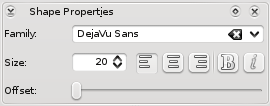Karbon/Tutorials/Artistic Text Shape/es: Difference between revisions
Created page with "== Primer paso con una forma de texto ==" |
Created page with "{|class="tablecenter vertical-centered" |Image:Add-artistic-text-shape.png || Para añadir una forma de texto artístico, ve al anclaje <menuchoice>Añadir una forma</menucho..." |
||
| Line 11: | Line 11: | ||
{|class="tablecenter vertical-centered" | {|class="tablecenter vertical-centered" | ||
|[[Image:Add-artistic-text-shape.png]] || | |[[Image:Add-artistic-text-shape.png]] || Para añadir una forma de texto artístico, ve al anclaje <menuchoice>Añadir una forma</menuchoice>, haz clic en el icono <menuchoice>Texto artístico</menuchoice>, y arrástralo al lienzo. | ||
|} | |} | ||
Revision as of 14:07, 9 February 2011
Este tutorial te presentará lo que puedes hacer con la . Aunque este tutorial fue hecho usando Karbon, la forma está disponible en otras aplicaciones de KOffice, y funcionará de manera similar.
En esta lección
- crearás una forma de texto
- asociarás una forma de texto con una trayectoria
Primer paso con una forma de texto
 |
Para añadir una forma de texto artístico, ve al anclaje , haz clic en el icono , y arrástralo al lienzo. |
After adding the shape, you might want to edit the text and display something more interesting. To do this, you need to activate the , either by double clicking on the newly created shape, or selecting  in the toolbox. Then you can change the text to something like this.
in the toolbox. Then you can change the text to something like this.

After changing the to "Steve", the to 30pt, and setting , you can have the following shape in your canvas:

Path follower
This is still a very straight, flat text. Now we want a curvy text. To do this, we will need to create a path, for instance, using the ![]() .
.
You should have something like this:

To associate the text with the curve, you need to activate the by double clicking on the text, or selecting  .
.
Then, if you move the mouse on top of the curve you will see the cursor changing to a hand, you will need to click on the curve. In the
docker, the icon ![]() is now enabled, and you need to click on it to attach the path. Using the offset in the docker, you can adjust the text to get the following result:
is now enabled, and you need to click on it to attach the path. Using the offset in the docker, you can adjust the text to get the following result:

You can detach the path by clicking on ![]() . You can , and the text. If you change the curve, then the text will be updated.
. You can , and the text. If you change the curve, then the text will be updated.


